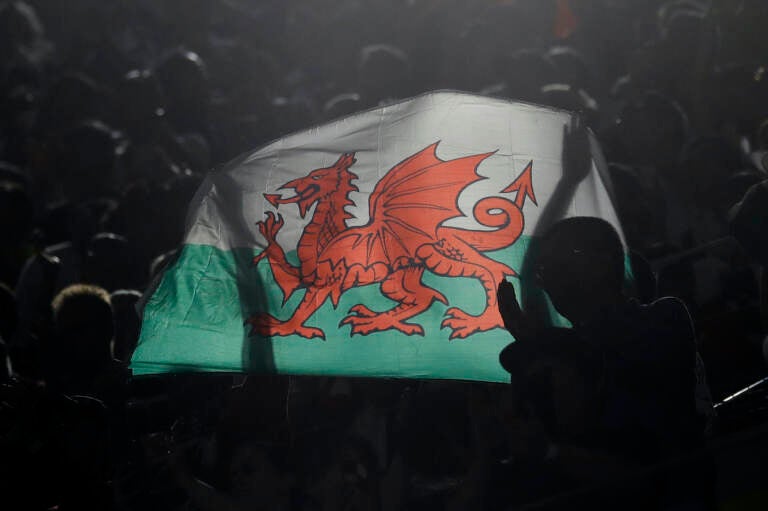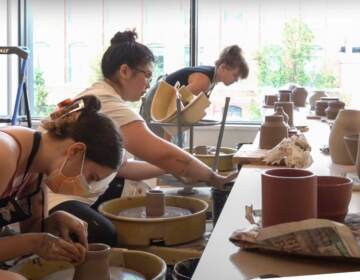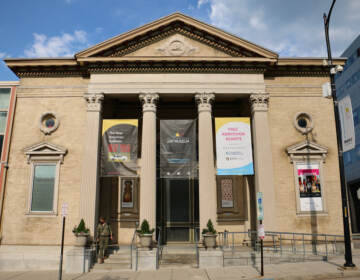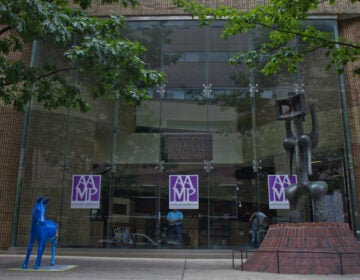Philadelphia welcomes the Welsh. They’ve been here for 300 years
The five-day North American Festival of Wales brings its celebration of Welsh culture to Philadelphia, where Welsh people have lived for over 300 years.

A welsh flag is held aloft. (AP Photo/Christophe Ena)
For the first time in 46 years, the North American Festival of Wales is coming to Philadelphia.
The five-day festival of Welsh culture likes to move around a lot. Since it was founded in 1929, the annual festival has preferred to touch down in new places, rarely visiting the same city twice. It was last in Philadelphia in 1976.
Starting Wednesday, August 31 through Sunday, September 4, the festival will be headquartered at the DoubleTree Hotel on Broad Street, with several events across the street at the Kimmel Center, featuring food, concerts, film screenings, and seminars about the language, history, and culture of Wales.

Catrin Brace, the festival’s special event coordinator and a steward with the local Welsh Society of Philadelphia, said it is unusual for the Festival of Wales to be in an urban core like Center City.
“For instance, we were in Washington D.C. a few years ago but we were slightly outside the city in Alexandria,” she said. “This is a real downtown, a major city, Philadelphia.”

One of the reasons the Festival of Wales decided to come to Philadelphia is the Welsh people have been here for more than 300 years. They were among the first European residents of what is now Pennsylvania.
In 1682 William Penn allotted about 40,000 acres of land to a group of Welsh Quakers fleeing religious persecution in Britain. Their intention was to acquire a large tract of contiguous land in what is now mostly the Main Line, to form their own colony with their own governance.
“They were going to call this New Wales, and William Penn was in favor of that,” said Brace. “But Charles II, the king, was not. Actually, William Penn tried to bribe the king so that he could call it New Wales, but he wasn’t having it. He wanted the name Penn on the state. So it became Pennsylvania, not New Wales.”
Nevertheless, Welsh names persist to this day: Bryn Mawr, Bala Cynwyd, Merion, Gwynedd. Attendees of the Festival of Wales can take tours by coach to see that historic Welsh Tract.
Building on the Festival of Wales, which is expected to draw about 500 people into Philadelphia for a five-day stay, the local Welsh Society added additional programming, expanding the festival into Philadelphia Welsh Week. It will feature family-friendly events, a free marketplace of Welsh goods at the Doubletree Hotel, a daily tea with Welsh cakes, and a map of local historic sites with ties to prominent Welsh immigrants.
The Society also made sure that Welsh food is available. Brace said most Philadelphians have likely never had authentic food from Wales.
“You can find Welsh rarebit at many pubs here, but on the whole it’s not very common,” she said. “In fact, you can’t say that Welsh food is common throughout the USA.”
Brace, a vegetarian, said she is particularly looking forward to Glamorgan sausages, made with native Caerphilly cheese and leeks. The Doubletree kitchen will be making Teisen Winwns (an onion and potato cake), Pastai (a savory pie), and of course rarebit. A variety of downtown restaurants have added traditional lamb dishes and will serve the Welsh Dragon: a cocktail of gin, vodka, triple sec, and juices to resemble the colors of the Welsh flag.
A central part of the Festival of Wales is singing. There are concerts scheduled with baritone John Ieuan Jones, the Eschoir male choir, soloists from the national Urdd Gobaith Cymru music program, and the annual Gymanfa Ganu, a participatory singing event of traditional four-part harmonies, now in its 90th year.
Vocal music has been an integral part of Welsh culture for centuries. Dubbed “The Land of Song,” Wales has produced many internationally recognized singers, like Tom Jones and Shirley Bassey.
“Male voice choirs were formed when the Industrial Revolution came to Wales, which was quite early,” said Brace. “Men went down to work in the mines and the ironworks and slate mines, and when they came out they needed something to do. So they got together and sang. This male voice choir tradition is still very, very alive and well in Wales.”
After all the activities on Thursday, Friday, and Saturday during the Festival of Wales, participants can wind down by singing together. A nightly informal singing session is planned as a kind of musical nightcap of all things Welsh.
WHYY is your source for fact-based, in-depth journalism and information. As a nonprofit organization, we rely on financial support from readers like you. Please give today.








